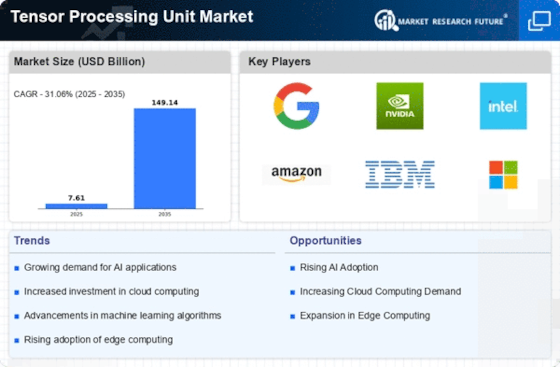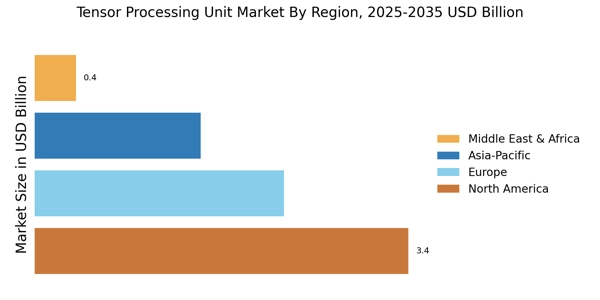Growing Focus on Edge Computing
The shift towards edge computing is reshaping the landscape of the Tensor Processing Unit Market Tpu Market. As more devices become interconnected, the need for localized data processing is becoming paramount. TPUs are particularly well-suited for edge applications, where low latency and high efficiency are crucial. This trend is likely to drive the adoption of TPUs in various sectors, including automotive, healthcare, and smart cities. Market analysts suggest that the edge computing segment could account for a significant share of the TPU market, as organizations seek to optimize their operations and enhance real-time data processing capabilities. The integration of TPUs in edge devices may lead to innovative applications and services.
Increased Investment in Cloud Infrastructure
The ongoing investment in cloud infrastructure is a key driver for the Tensor Processing Unit Market Tpu Market. As businesses migrate to cloud-based solutions, the demand for efficient processing units that can handle complex workloads is escalating. TPUs offer a compelling solution for cloud service providers, enabling them to deliver enhanced performance for machine learning and data analytics tasks. Recent data indicates that cloud computing is expected to grow at a rapid pace, with TPUs playing a pivotal role in this transformation. This trend suggests that the TPU market will continue to expand as more organizations leverage cloud technologies to improve their operational efficiency and scalability.
Rising Demand for High-Performance Computing
The demand for high-performance computing solutions is on the rise, driven by the need for faster data processing and analysis. Industries such as finance, healthcare, and telecommunications are increasingly relying on advanced computational capabilities to handle large datasets. The Tensor Processing Unit Market Tpu Market is experiencing growth as organizations seek to enhance their computational power while reducing latency. According to recent estimates, the market for high-performance computing is projected to reach substantial figures, indicating a robust demand for TPUs. This trend suggests that businesses are prioritizing efficiency and speed, which TPUs are well-equipped to provide, thereby solidifying their position in the market.
Advancements in AI and Deep Learning Technologies
The rapid advancements in artificial intelligence and deep learning technologies are significantly influencing the Tensor Processing Unit Market Tpu Market. As organizations strive to implement AI-driven solutions, the need for specialized hardware like TPUs becomes increasingly apparent. These units are designed to accelerate machine learning tasks, making them essential for applications ranging from natural language processing to image recognition. The market is expected to witness a surge in demand as more companies adopt AI technologies, with projections indicating a substantial increase in the deployment of TPUs in various sectors. This trend underscores the critical role of TPUs in facilitating the growth of AI applications.
Emergence of New Applications in Various Industries
The emergence of new applications across various industries is driving the growth of the Tensor Processing Unit Market Tpu Market. Sectors such as automotive, healthcare, and finance are increasingly adopting TPUs to enhance their operational capabilities. For instance, in the automotive industry, TPUs are being utilized for autonomous driving technologies, while in healthcare, they are applied in predictive analytics and diagnostics. This diversification of applications indicates a growing recognition of the value that TPUs bring to different sectors. Market forecasts suggest that as more industries explore the potential of TPUs, the market will likely experience sustained growth, reflecting the versatility and adaptability of these processing units.

















